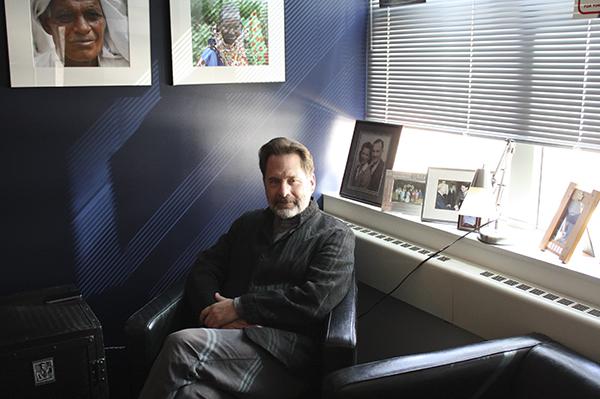Updated: March 7, 2016 at 8:40 a.m
A School of Media and Public Affairs professor will serve concurrent appointments at two prestigious institutions this fall.
Steven Livingston, a professor of media and public affairs, will take a sabbatical to be a visiting scholar at the Brookings Institution from May through December to research how human rights organizations use modern technologies. He will also be working as a fellow at the Carr Center for Human Rights Policy at Harvard University from September through December.
Livingston’s research examines how organizations like Amnesty International use technologies like satellite imaging and DNA matching to identify instances of large-scale human rights abuses, and to build a case for holding perpetrators accountable. Forensic anthropologists in Guatemala use this technology to identify the remains of people killed in civil war.
Livingston said these fellowships will contribute to what he teaches in his courses in the Elliott School of International Affairs and SMPA. Much of Livingston’s teaching has to do with effect of information communication technology on politics and policy. He will return to teach in the fall of 2017.
“Teaching informs research. Research informs teaching,” Livingston said. “If you’re doing that, then it’s a good combination.”
Last semester, he worked on his research in Germany through a fellowship with the Free University of Berlin.
Livingston said he hopes to expand his current research by examining how international organizations use technology to monitor and combat environmental issues and other international problems.
“Those same satellites that are being used to monitor human rights abuses are also being used to monitor receding glaciers,” Livingston said. “There are all kinds of ways in which these technologies are being used.”
Livingston said working at GW and living in D.C. has been one of the greatest assets to his research because of the access to research centers like Brookings.
“One of the great things about the work that I’m doing is that so many of the people I’d want to talk to are actually here in Washington, and they’re right here at GW,” Livingston said.
Livingston has covered similar topics in his courses since coming to GW in 1991. He taught a Dean’s Seminar on globalization from 2008 to 2009, which he said inspired and aided his current work. Through teaching this course, Livingston traveled with students to Peru, Chile, Malaysia and Singapore, where they explored historical landmarks and locations like the torture centers used during Pinochet’s regime in Chile.
“The work I’m doing now has been gestating and percolating ever since GW saw fit to send me and these students off to these opportunities,” Livingston said.
SMPA Director Frank Sesno said that being a visiting scholar at a place like Brookings is no small honor, but is not uncommon among GW professors.
“While it’s a loss for our students for him not to be with us for the duration of his fellowship, over time it is an enormous net gain because his scholarship and his connections in the field make it even more valuable,” Sesno said.
Sesno added that having professors become visiting scholars at other institutions brings additional real world insight and expertise to the University, which can improve teaching and research.
“For Professor Livingston to have fellowships of this stature is a reflection of his accomplishments and his recognition in the field,” Sesno said. “It also enables him to take his research to the next level.”







